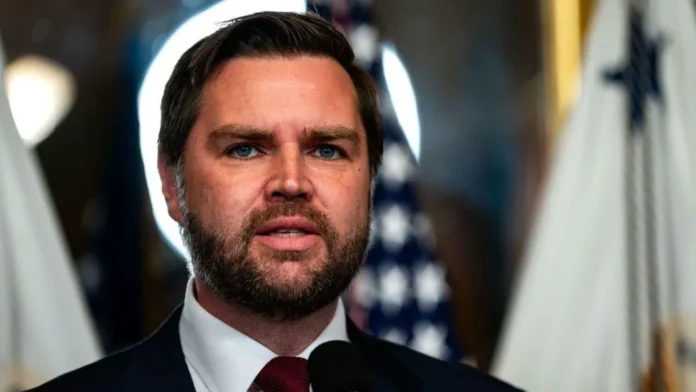Vice-President JD Vance has suggested judges do not have authority over the Trump administration’s executive power, as the White House responds to a flurry of lawsuits that aim to stall its agenda.
“Judges aren’t allowed to control the executive’s legitimate power,” he wrote on X.
Vance’s remarks on Sunday came less than 24 hours after a judge blocked members of Trump’s newly created advisory body, the Department of Government Efficiency (Doge), from accessing sensitive US Treasury Department systems.
During his first three weeks in office, President Donald Trump has signed dozens of executive orders, many of which are alleged by his critics to have exceeded his constitutional authority
The administration, seeking to swiftly and dramatically reshape the federal government, is being challenged in the courts by more than two dozen lawsuits.
In Vance’s social media post, he cited other types of decision making by the executive branch that he suggested were outside the law.
“If a judge tried to tell a general how to conduct a military operation, that would be illegal. If a judge tried to command the attorney general in how to use her discretion as a prosecutor, that’s also illegal,” he wrote.
Liz Cheney, a former Republican House representative who campaigned in the presidential election against Trump, snapped back at Vance.
“If you believe any of the multiple federal courts that have ruled against you so far are exceeding their statutory or constitutional authority, your recourse is to appeal,” Cheney wrote on X.
“You don’t get to rage-quit the Republic just because you are losing. That’s tyranny.”
Vance has previously suggested that the president can directly challenge judicial rulings that seek to curb White House power.
On a podcast in 2021, he suggested that a future Trump administration should sack “every single midlevel bureaucrat, every civil servant in the administrative state, replace them with our people”.
“When the courts stop you, stand before the country like [early US president] Andrew Jackson did and say: ‘The chief justice has made his ruling. Now let him enforce it,’” Vance said.
While Democratic politicians have been quick to denounce Trump’s actions, without control of Congress their legislative options to curtail the president are limited.
Some, like Massachusetts Senator Elizabeth Warren, have attempted to marshal popular opposition to the Doge-led attempts to shutter entire government agencies.
“In the building behind me, Elon Musk is seizing power from the American people,” she said last week at a rally outside the Treasury Department in Washington, DC. “We are here to fight back.”
Warren is set to lead another rally on Monday, but the public outcry against Trump’s measures has generally been muted compared to the early days of his first presidential term.
It is only in federal courthouses that Trump’s opponents have had substantive success in derailing his administration’s efforts – at least for now.
Cases filed by Democrats and outside groups have prevented several of Trump’s executive orders from going into effect, with federal judges issuing temporary blocks
On Sunday a union representing employees at the Consumer Financial Protection Bureau (CFPB) filed lawsuits seeking to stop the shutdown of the agency and prevent Doge from accessing employee records.
Over the weekend, Russell Vought, head of the Office of Management and Budget who was also named acting head of the CFPB ordered employees to stop much of their work formulating rules and investigating financial institutions.
The agency was set up to protect consumers in the wake of the 2007-08 financial crisis, and says it has recovered billions from banks engaging in illegal or questionable business practices.
But the Trump administration claims that the CFPB has overstepped its authority, in some cases unfairly targeting financial institutions and using money from fines to fund left-wing not-for-profit groups.
Source: BBC News




